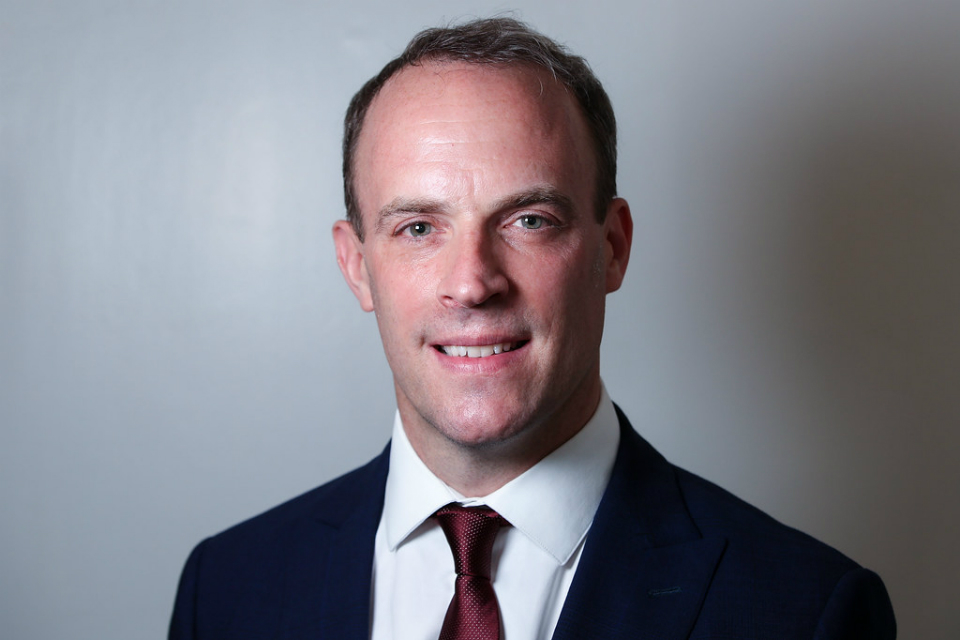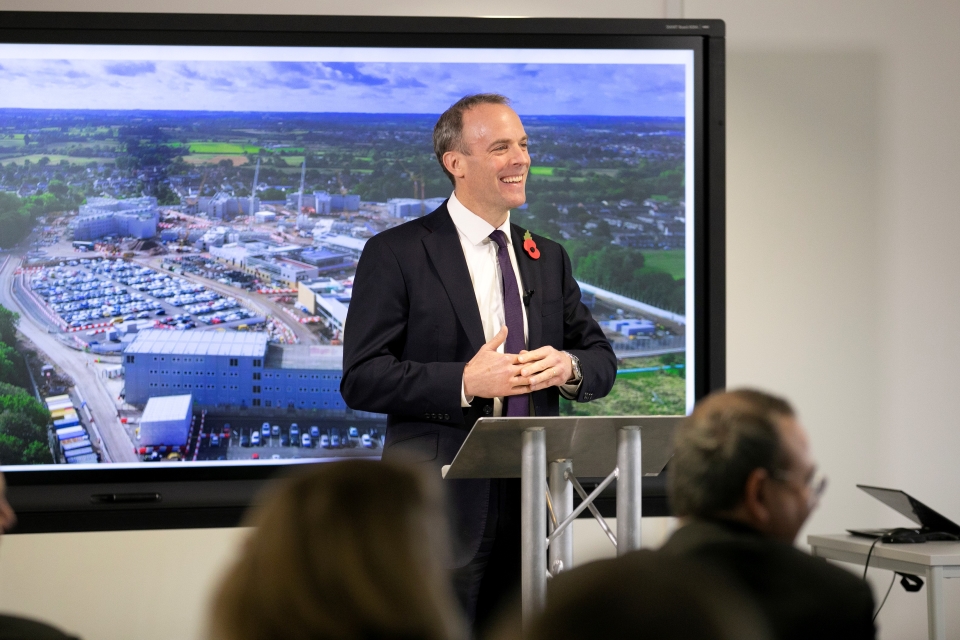Deputy Prime Minister attends topping out ceremony for new prison at Glen Parva
The Rt Hon Dominic Raab MP, Deputy Prime Minister and Justice Secretary, spoke at a ceremony to mark the last phase of major construction work at the new prison at Glen Parva in Leicestershire – about his plans for state-of-the-art prisons that put purpose at the core of rehabilitation.

Watch the Deputy Prime Minister’s speech below:
Justice Secretary and Deputy Prime Minister Dominic Raab speech
I’m really pleased to be here for this milestone for the project, which has been more than five years in the making. I know my friend Alberto Costa MP and Blaby Council were instrumental in getting it off the ground and continue to be huge supporters.
I want to thank everyone involved for keeping the project on track, despite the huge challenges with the COVID-19 pandemic.
The development here at Glen Parva is part of the most ambitious building programme in more than a century. The government has earmarked £3.8 billion to build six state of the art prisons and expand other sites across the country, so that we can protect the public from dangerous criminals and cut crime.
The huge investment will create up to 18,000 additional prison places and up to 2,000 temporary ones, which will give us more flexibility as our tougher sentencing rules come into force and we make progress working through the court backlogs.
1,700 of those places will be right here at Glen Parva.
And the work being done here is helping us to learn lessons, so that we can design better prisons right across the country.
You will have seen the coverage this week of COP26, the UN climate change conference, which the UK is hosting. The industry-leading methods being used to construct the site here at Glen Parva mean the build will have far less impact on the environment than previous prison builds.
In fact, many of the materials being used to bring this project to life come from sustainable, recycled sources.
This isn’t just making the site more eco-friendly, it also makes the project more cost-effective, so it’s better for taxpayers.
The design builds on efficiencies we’ve made at other prisons like HMP Berwyn in North Wales, which had a 23 percent reduction in carbon emissions compared to the older parts of the prison estate.
And we’ll take what we learn here to make sure that the next four prisons we build, starting at Full Sutton near York, will emit around 90 percent less CO2. And eventually, those sites could be net zero carbon emissions.
What will be on offer at the prison
But while the prisons will have less impact on the environment, they’ll have more impact on cutting crime – by putting purpose at the forefront of everything they do.
Because prisons shouldn’t just be holding cells for offenders to while away their days, waiting for their sentences to finish so that they can get back to lives of crime.
That would be a waste of their time and taxpayer’s money.
Prisoners should spend their sentences working to get their lives back on track, getting clean from any dependencies on drugs or alcohol, and into purposeful activity that will help them to make a success of their release and turn their lives around.
That’s what the prison here at Glen Parva will do.
In fact, we’ve engaged with offenders, prison officers, and charities and used data and academic research to design a state-of-the-art environment that will support offenders every step of the way.
First with education.
The new prison will be the most technologically advanced in the estate, with digital in-cell technology, so that offenders can take full advantage of education and training opportunities.
This would allow them to work on basic skills like maths and English but also to participate in vocational courses, for example, in IT and engineering.
Prisoners will be able to hold these qualifications and achievements in ‘digital backpacks’ – as they will at HMP Five Wells – so that what they study on the inside can be put to use outside prison.
Second, with huge training workshops, the prison will ensure that offenders have every opportunity to gain and hone new skills in things like carpentry, plumbing, and bricklaying.
Taken together, this education and training is crucial.
Because it makes offenders more employable.
If they have jobs within the twelve months after release, they are up to nine percentage points less likely to reoffend. What’s more, we’ve got around a million job vacancies right now, so making sure offenders can get jobs means we can help address labour shortages in the economy.
I hosted a summit with employers a couple of weeks ago to talk about how we can build better links between prisons and local businesses.
I want us to learn lessons from the schemes doing that so brilliantly in the prison estate already. Like at HMP High Down, where the prison governor is doing everything possible to ensure offenders can work in a call centre run by Census Life.
Those prisoners aren’t just gaining new skills
They’re experiencing what it’s like to have responsibility and to earn a wage – some of them for the first time.
As soon as the gates are bolted on, I want to see the prison here at Glen Parva building similar links with local businesses.
So that it can look at where the skills gaps exist in Leicestershire and start training offenders accordingly.
Third, the prison will be able to help offenders address any mental health problems or addictions that could be holding them back from getting their lives back on track.
In fact, we’ve recently started trialling technology in prisons that means offenders can get help from medical professionals via virtual appointments – making it swifter, easier, and quicker to access diagnosis and treatment. And finally, the prison will make sure that offenders have the support in place to make a success of their release.
That will include maintaining links with their family and making sure they’ve got stable accommodation to go to.
The in-cell technology will enable prisoners to keep in touch with a small number of important contacts, So that they can try to maintain some level of family or social support throughout their time inside, which will be there for them when they leave.
So, the prison being built here will bring together all of the key strands of rehabilitation we need for reform of offenders.
They won’t waste their time inside.
Every moment will be spent on purposeful activity, geared towards equipping and enabling them to take the second chance to go straight, make a better life for themselves and their family, and make a positive contribution to their community.
That’s the most sustainable way to bring down crime in our country and it’s what we are designing and building at the state-of-the-art facility here at Glen Parva.

Benefits for the local community
To demonstrate what is possible here, forty-seven local ex-offenders and prisoners on day release have been involved with the building project – learning new skills and getting work experience.
And the project is bringing a range of other benefits locally.
£68 million has been invested into the local economy as part of the build.
Almost a third of that money – £18 million – has gone to local small and medium sized businesses, and there will be plenty more local investment before the project comes to fruition.
When it is operational, there will be more than 600 jobs available for local people at the prison. The bulk of them will be prison officer roles but there will also be opportunities in healthcare, education, training, maintenance and administration.
So, it has the potential to have a positive impact on the local area.
Close and naming the prison
So, in closing, let me just say a huge thank you to everyone involved in this project.
We’re looking forward to working with local councils, Lendlease, our suppliers, the local community and others to get it operating by the spring of 2023.
We’re launching the appeal today for a new name for the prison – one that best reflects the local area.
This new prison build is an important part of our mission as a government, and a country, to build back better – beating crime and turning offenders’ lives around, so that we can make our streets safer and local communities stronger.
Thank you.